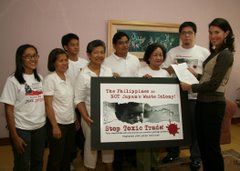by Ester V. Perez de Tagle
Please allow me space for this reaction to former Ambassador Albert Del Rosario's article of May 2-3, 2008 [see original article here), to point out inaccuracies in the interest of fair play, correct information and the public good.
(1) It is already a fact, stated by constitutional experts and accepted by constitutionalist Sen. Miriam Defensor Santiago who, as Chair of the Senate Foreign Relations Committee has been tasked to look into the legal aspects and submit the necessary Foreign Committee Report on the Jpepa, that it is unconstitutional and lopsided. Her conclusion was unchallenged during the interpellation after her Senate report. Sen. Santiago, probably to provide a graceful exit all around, feels constrained to resort to legal gymnastics to come up with "an improved treaty" to ensure "compliance with at least 15 specified constitutional provisions" via a side agreement with which she hopes to get the Senate's conditional concurrence. She says further: " the basic issue with Jpepa was that the advantages were in favor of Japan, but not necessarily for the Philippines. Another issue was that Jpepa failed to include reservations that Japan has already conceded to Thailand, Malaysia and Indonesia." She said the conditions for the concurrence were an "absolute necessity" because she is sure the Supreme Court would declare the Jpepa, ratified as is, unconstitutional. Then Japan could sue us since the Vienna Convention on the Law of Treaties provides that a party may not invoke internal, even constitutional law, as a defense for not honoring an international agreement. But why ratify even "conditionally" such an undeniably flawed agreement in the first place? The safest and most logical option is to reject it. .
(2) The Bilateral Free Trade Agreement that Mr. del Rosario wanted us to pursue during the 2002 APEC meeting in Mexico with the U.S., which he called a "pioneering initiative" and a "unique opportunity" missed, is neither pioneering nor unique. We had the onerous Bell Trade Agreement which the Philippine legislature ratified just two days before our independence. It required us to amend our Constitution to grant equal economic rights to Americans. With this Parity Amendment, we were treated like an American economic colony although we were already politically independent. This stunted our economic growth. We fought the Filipino-American War of 1898 before the Ameicans finally subjugated us. Are we now, going to surrender our sovereignty and grant the same parity rights under Jpepa Art. 89 to Japan, a former and unrepentant oppressor without a single shot being fired?
(3) Mr. Del Rosario's "reasonable assumption" showing full faith that "the provisions of the Jpepa were expertly negotiated in great detail by both sides " was sadly mistaken. The Philippine panel miserably failed in its sacred task of protecting our country's interests and could not even satisfactorily answer many basic questions, especially with regards to defects pointed out by the NGO panel, prompting an exasperated senator to ask, "why don't you do your homework like the NGO's?" When asked about the
outrageous provisions of Art.93, prohibiting the Philippines from demanding technology transfer and the hiring of Filipinos, not found in Japan's EPA's with other countries, the Philippine panel head replied: "I am stupefied.". The Executive Department officials failed to show to the Senate, Jpepa's economic benefits with their optimistic projections, expectations and misleading figures, mere speculations and forecasts not backed by solid evidence. The oppositors not only successfully refuted their arguments but also showed that they "wrongly and criminally" used a Japanese macroeconomic study to defend Jpepa. Was the voluminous Jpepa agreement "ready-made" by the Japanese too, and spoon-fed to the Philippine panel to make it "made-to-order" for Japan? This would explain why the panel seemed so clueless during the Senate Hearings (as the transcripts should bear out) about the agreement they were supposed to have negotiated. The bigger question is why was such a flawed bilateral agreement, made by such inept negotiators not rejected outright by the Senate?
(4) How can Philippine exports grow with Jpepa which allows our market to be our competitor in the use of our own production sources? Jpepa allows hi-tech Japanese factory ships to fish in our waters. Equipped with the latest in sonar technology to zoom in on the big catch and freezers that freeze fish in five seconds to ensure maximum freshness for storage while waiting for processing, packaging or canning right on site, ready for the international and even our very own local market in no time and at cheaper prices, what chance does our fishing industry have and what exports are we talking about? How about our poor fishermen who depend on the sea for livelihood and survival? Such injustice in our seas would be replicated in our forests and farmlands under Art. 89 of Jpepa. Furthermore, small and medium industries, the backbone of our economy, deprived of tariff protection and lacking government support systems, would inevitably die. Contrary to Mr. del Rosario's contention, the loss, not the creation of jobs, and the worsening of poverty would be the end result. Besides, how can Mr. del Rosario talk of job creation and fruitful partnerships when Jpepa expressly prohibits the Philippines from demanding technology transfer and the hiring of Filipinos?
(5) Mr. del Rosario says that " In a dialogue with the Japanese Embassy, it was established that the agreement fully advocates environmental protection…there has been no case whatsoever of Japanese toxic waste export to the Philippines since the Basel Convention of 1993." Wrong! First of all, Japan and the Philippines are not signatories to the later, mandatory Basel Ban on waste trading. Therefore, we cannot invoke it for protection. In July 1999, 122 forty-foot Japanese container vans reportedly carrying waste paper for recycling were opened in the port of Manila. They contained not waste paper for recycling but hazardous, toxic and infectious hospital waste. This was reported in the papers and the public outrage forced the Japanese government to repatriate their deceptively dumped waste. Moreover, an AP Tokyo, 1998 news report says: "Japan has a new export for the world-garbage. Export of hazardous materials is banned by international conventions. So businessmen are just calling it something else." Health and Welfare Ministry official Tatsuro Akashi confirmed this, saying "there is no objective definition to distinguish waste from goods". No wonder, Japan insisted on listing toxic waste as tradable goods entitled to preferential treatment with 0% tariff.
The Japanese use of personal connections as a means to advance its interests is disturbing. Dean Hideo Kobayashi, of the Graduate School of Asia-Pacific Studies, Waseda University, in his book, "Postwar Japanese Economy in Southeast Asia" quotes Goto Noboru, vice president of the Tokyo Chamber of Commerce and Industry who dealt with economists and businessmen from the Philippines and other Asian countries, stating "the importance of personal connections in the development of foreign business." Japanese businessmen play a key role in their government's policy-making and Goto's view can be said to reflect such policy. Goto said: "close connections were useful in the expansion of the Tokyo group…only the financial people count, through the joint venture and overseas transfer of production base…" So, never mind the other stakeholders?
This means lavish wooing of trade and industry officials and business leaders of the targeted host country. The problem with using personal relations in national agreements is that such relations benefit only the decision makers courted, and not the nation they are supposed to uphold. Furthermore, the mention of "overseas transfer of production base" should make us wary. Japan, a small island state, is finding it harder to cope with the toxic waste generated by its high industrialization and could be expected to transfer its dirty industries to the Philippines.
International experts call Jpepa a "mega-treaty". It encompasses practically all aspects of our national life. Our Senators should not be stampeded into ratifying it with the threat of being "left behind". Which is the greater threat, being left behind in the rush to be swallowed up in the revival of Japan's expansionist "Greater East Asia Co-Prosperity Sphere" which triggered World War II, or waking up one day to find out that we no longer have a country to call our own, or worse, being left with an inhabitable wasteland which cannot sustain life?.
. The onset of Climate Change brought about by modern man's unsustainable development fuelled by globalization has shown the folly of the unbridled pursuit of such development paradigm. Our ecosystems are collapsing and the food, water and fuel crises that environmentalists have warned about are now upon us. In the scramble for scarce resources, our government must prioritize the security of the Filipino people. Conservation and wise use of resources are imperatives for survival and people development for the economic empowerment of communities a must for real development. The Jpepa is the antithesis of such imperatives. While the arguments for Jpepa are not based on facts but on shaky projections and expectations, the arguments against Jpepa are based on the strongest and most solid evidence, the text of the Jpepa agreement itself and its annexes and reservations. We earnestly urge those who want to know the truth to get hold of these and even the transcripts of the Senate hearings. Let the Jpepa, ill-conceived in the darkness of secrecy {even the Congressional party- list, Akbayan had to file a case in court to get a copy) be exposed to the clear light of truth and be subjected to stakeholder consultations and debates both in public fora and on the Senate floor, as such a crucial issue should be dealt with in a true democracy.
Ester V. Perez de Tagle is the founder of Concerned Citizens Against Pollution (COCAP). She was a member of congressional TWG's of several environmental bills that became law.
Saturday, May 31, 2008
Subscribe to:
Post Comments (Atom)






1 comment:
A BETTER LIFE FOR YOU
#1
"Why Should I Go On A 12 Week Diet, When I Can Lose All The Weight In Just 28 Days?"
Read On To Find Out The Exact System That Can Do This For You
Have the Summer of Your Life as You ....
Lose More Than The 'Standard' 1-2lbs per Week. Discover how losing more than 2lbs a week is not only possible but safe..
www.weightlosssecret2.blogspot.com/
#2
Home-Business that really works
earn $15.000 in 25 days over and over, Check this out
Join Now
Join This Internet Cowboy today and receive:
-Your very own 9 Dollar Solution website setup for FREE!
-1 year pre-written automated salesman... FREE!
-Methods used by online pro's that never require you to risk money!
-Multiple streams of automated residual income!
-Step-by-step marketing instructions to make quick cash!
-FREE lifetime support and training From The Internet Millionaire Cowboy himself!
-SUPPORT, SUPPORT, SUPPORT... And Even more SUPPORT! And much more... The possibilities are truly unlimited!Get your new website
today at:
$9 Dollar solution
JOIN NOW
Recent Comment "
I subscribed to the $9 dollar solution a few weeks ago. Wow! So simple and yet brilliant. many thanks for recommended me this
site"
Dr. Mike (USA)
$9 Dollar Solution "On Oprah Friday"
www.homebusiness02.blogspot.com/
Post a Comment